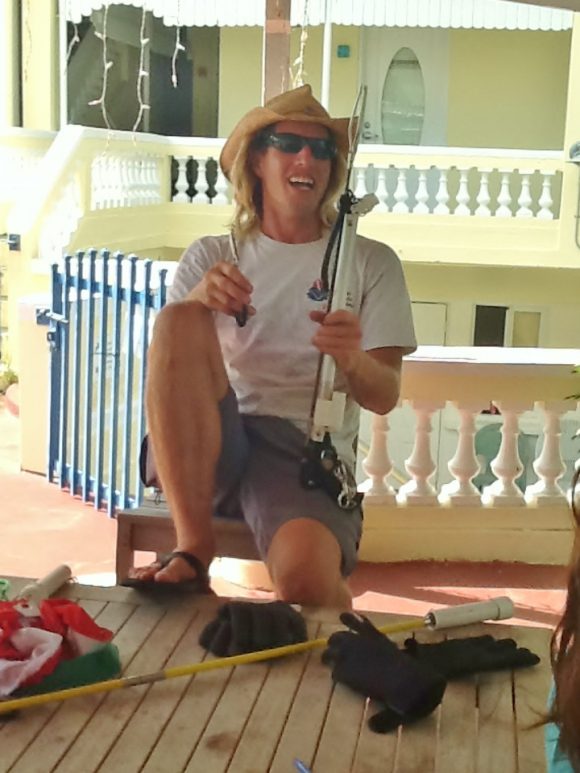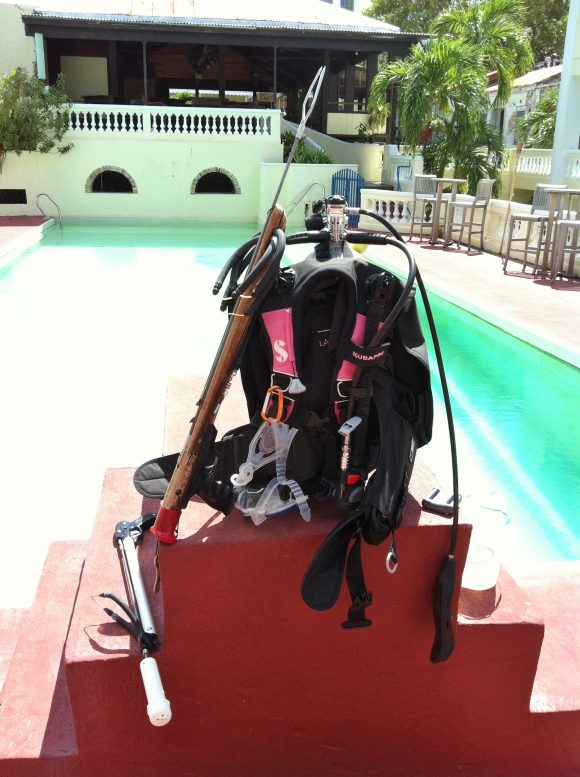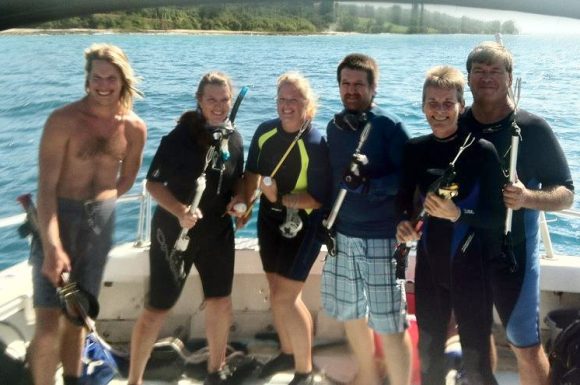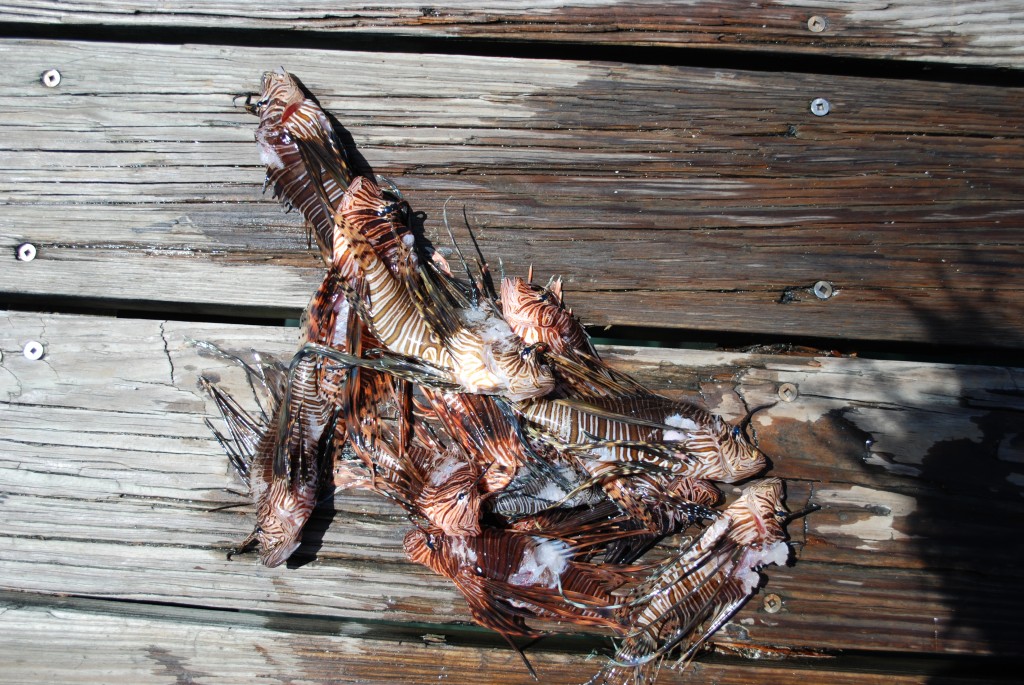
Invasive Lionfish: Poisonous. Devastating.
Got your attention didn’t I?! Well, these aliens in our waters are no joke. Invasive Lionfish are native to Indo-Pacific waters where they are kept in check by their natural environment and predators like grouper that are familiar with hunting them over thousands of years. However, here in the Caribbean, they are a new and alien species that multiply like crazy and have no natural predators – and they are taking over our reefs at an alarming rate. When I first started diving 10 years ago, we hadn’t even heard of lionfish in these waters. In fact, it’s only been in the past few years that they have been seen here at all. And now, I can almost guarantee I’ll see AT LEAST one on each dive I do. It’s scary. According to Dr. Mark Hixon from Oregon State University who is studying lionfish in the Bahamas along with NOAA’s Undersea Research Program (NURP), “Due to their population explosion and aggressive behavior, lionfish have the potential to become the most disastrous marine invasion in history by drastically reducing the abundance of coral reef fishes and leaving behind a devastated ecosystem.”
The commonly agreed upon theory is that invasive lionfish were first introduced into Atlantic waters in the 1990s by aquarists dumping their exotic tanks into the ocean after hurricanes in Florida. (or maybe flushing ala Finding Nemo?!) and have subsequently spread up the East Coast and down into the Caribbean following the reefs of the Antilles chain. Genetic testing of lionfish in the Atlantic shows that this rapid spread could be the result of as few as THREE of the little buggers being released into Florida’s waters. According to Smithsonian Magazine “In 2000, a recreational diver saw two tropical lionfish clinging improbably to the submerged ruins of a tanker off the coast of North Carolina, nearly 140 feet below the surface. She alerted the National Oceanographic and Atmospheric Administration, which started tracking lionfish sightings in the Atlantic. Within two years, the fish had been seen in Georgia, Florida, Bermuda, and the Bahamas. They are now known to live from Rhode Island to Belize.” Talk about an Alien Invasion!
So what’s the big deal? Well, I’ll tell you. They may be beautiful, but they are deadly to our reef ecosystems. Lionfish can grow up to a foot long and eat fish as large as 2/3 the size of their own body and their stomachs can expand 30 times their normal size. They have voracious, non-discriminating appetites that include shrimp, parrotfish, juvenile groupers, and other inhabitants of the coral reef system. They can lay up to 2 MILLION eggs per year that float on the surface and are carried swiftly by the ocean currents to new locations. In many areas of the Atlantic seaboard – including North Carolina – lionfish have become the predominant species on the reefs. Parrotfish are just one species that play a critical role in the reef environment eating algae and preventing it from smothering the coral polyps. This invasion has an obviously devastating effect not only on the reef ecosystems but with a trickle-down effect on local, commercial, and sport fishing and other underwater tourism (snorkeling and Scuba diving).
“I call them the Norwegian rats of the sea,” said George Burgess, director of shark research at the Florida Museum of Natural History. “Just like rats, they are spreading all over the world, and you can shoot them, poison them, or curse them all you want, but they aren’t going to go away.”

Not one to take this invasion sitting down, I decided to do my part, along with a group of dive buddies, and take a PADI Lionfish Eradication Specialty Course from St Croix Ultimate Blue Water Adventures here on St Croix. In fact, I was lucky enough to be taking the course by the guy who wrote it – Dive Instructor Simeon Tolar Yep, I’m now a card-carrying Lionfish Huntress! I opted to take a class, rather than just go out and start shooting for a few reasons. First, Lionfish are venomous and their spines pack a powerful punch. I wanted to be sure that I knew the proper way to handle them without getting hurt and I needed to know what to do in case I got speared by the spiny brats. Second, our coral reefs and reef fishes are vulnerable enough to begin with. Without having proper instruction, I would run the risk of doing more damage than good. The St Croix SCUBA course was offered in one day or taken in two sessions which was most convenient for our group. Our first session involved a brief lecture on the history of the invasion and the biological facts about lionfish – then we got into the pool with our gear on and practiced hitting targets with both spear guns and poles (I prefer the pole method). I’m so glad I got to practice in the calm of the pool. It gave me the relaxed environment I needed to get comfortable with the equipment and a non-moving target.


For our next session, we headed out on the boat to a reef on the West End of St Croix that Simeon guaranteed would have plenty of live targets. And, scary but true, he didn’t disappoint us. We did two tanks on that one spot and the lionfish were plentiful. I think everyone in our group speared at least two. Not an easy task! While lionfish remain fairly still at first, they are sneaky and as soon as you take a shot – and miss – they jump and hide in deeper holes. Still, I got one and was wildly satisfied at being a new hunter, much to my surprise.


Scuba Divers and researchers in locations throughout the Eastern Seaboard and the Caribbean are getting involved and coming up with some innovative ways at battling the invasive lionfish problem…

Some locales like the Florida Keys are adding lionfish to the menu and say they are quite tasty. Eco-conscious restaurateurs are doing the right thing by paying top dollar for lionfish meat and forgoing Grouper on their menus (we need the grouper to eat the lionfish or eventually there will be no fish for you!). Unfortunately, in the USVI, our lionfish have tested positive for Ciguatera, so it is not advisable to eat them. Ciguatera is a foodborne illness caused by eating carnivorous, predatory reef fishes that have been contaminated with toxins. The toxins are originally produced by microscopic dinoflagellates that attach to corals, algae, and seaweed in tropical and subtropical waters.
Smaller, herbivorous fish eat the dinoflagellates and then the little fish are eaten by the larger carnivorous fish (like lionfish). By ingesting multiple infected fishes, the predatory fish accumulate the toxin in high levels in their flesh. When these fish are consumed by humans, they pass along the ciguatera toxin in levels high enough to cause gastrointestinal and neurological effects that can be misdiagnosed as multiple sclerosis. Nasty stuff. Currently, there are no known treatments or antidotes. Most people eventually recover on their own but symptoms can last for weeks to a year with some long-term cases lasting as long as 20 years. For more information visit: https://en.wikipedia.org/wiki/Ciguatera
Here in the USVI and on St Croix Scuba divers are taking matters into their own hand with groups like The CORE Foundation The Caribbean Lionfish Response Program is unique proactive program designed to keep the invasion of the Indo-Pacific Lionfish from destroying our sea life, corals and reefs. The CLRP is collaborate effort comprised of Dive Shops donating boats at reduced rates, volunteer divers donating their time and money and Commercial Fishermen whose eyes and efforts throughout the waters of the Caribbean are invaluable. All these components are working together towards one common goal, keeping the Caribbean Lionfish Free.


